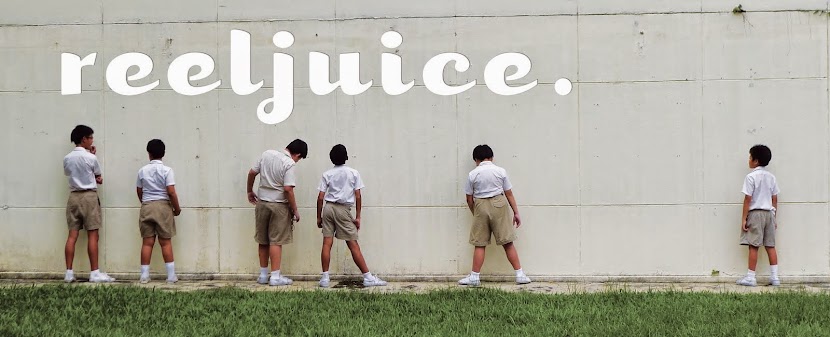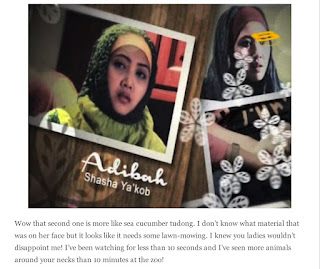Sometime in mid-2012, I attended a support group session for mentally-ill patients persons with mental health issues at Masjid Al-Khair. It was a rather moving experience for myself. I met with patients of different conditions.
Being with them reminded me of a deceased member in my family who was "incoherent" - which I learnt afterwards had extreme schizophrenia. I could only remember vaguely of that relative as it has been a long time ago when I was still a child. I recall my late father used to snap at any of us siblings every time gila ('mad' in Malay) was randomly used in a condescending manner in the house. I guess that early experience trained my siblings and I to be more mindful before we hurled insults (jokingly or otherwise) to one another. That mindfulness and tact got extended when we meet other similar persons outside the house or family circle.
There are other types of mental illness besides schizophrenia, ie extreme depression and bipolar disorder. Untreated, these conditions become detrimental to the sufferers and undue - in many cases, unnecessary - stress to the caregivers and loved ones. Professional help is available if one seeks it.
Thus when I was invited my conscience triggered my social responsibility to do something to highlight such health conditions. Also, I reckon this is a perfect outlet to give back to the community who has been supportive of my work. The visual medium can be effective to affect social awareness and commentary.
Stigma is the worse form of prejudice. It hinders rehabilitation.
Another hindrance to recovery is superstition. In the Malay community, open engagement to such condition is still considered tidak sopan or disrespectful. Asians are generally too steeped in "saving face" that conditions such as these are left locked at the back rooms of households. In this day and age, I'm disturbed that there are still factions in the community who are ignorant/do not have access to proper treatment in mental health issues.
Healing begins when we empower ourselves against the stigma at these mental patients. There is one person with mental health issues in every family and among our friends whether we like it or not. Healing begins when we accept our fractures and reach out to one another.
I took it upon myself to invite established actor friends (that were available during the filming) to be in the films - reason being that the cause would have better visibility by having established cast ensemble (ie Seriwahyuni Jaes, J Rosmini, Adrian Pang, Izzat Mohd Yusoff, Keatar HM, Era Farida, Nadiah Mohd Din, Zaleha Hamid, Siti Aishah Ahmad, Sani Hussin).
Alhamdulillah, I am very thankful that all the ensembled cast agreed to my call without hesitation. All the cast and crew came together with pure intention to propel our community forward. I'm truly humbled to be in the company of people to do Good, Ikhlas.
All four films were filmed in 2 days during the month of Ramadan 2012. These films were launched on 30 January 2013. They are 5 mins each.
Being with them reminded me of a deceased member in my family who was "incoherent" - which I learnt afterwards had extreme schizophrenia. I could only remember vaguely of that relative as it has been a long time ago when I was still a child. I recall my late father used to snap at any of us siblings every time gila ('mad' in Malay) was randomly used in a condescending manner in the house. I guess that early experience trained my siblings and I to be more mindful before we hurled insults (jokingly or otherwise) to one another. That mindfulness and tact got extended when we meet other similar persons outside the house or family circle.
There are other types of mental illness besides schizophrenia, ie extreme depression and bipolar disorder. Untreated, these conditions become detrimental to the sufferers and undue - in many cases, unnecessary - stress to the caregivers and loved ones. Professional help is available if one seeks it.
Thus when I was invited my conscience triggered my social responsibility to do something to highlight such health conditions. Also, I reckon this is a perfect outlet to give back to the community who has been supportive of my work. The visual medium can be effective to affect social awareness and commentary.
Stigma is the worse form of prejudice. It hinders rehabilitation.
Another hindrance to recovery is superstition. In the Malay community, open engagement to such condition is still considered tidak sopan or disrespectful. Asians are generally too steeped in "saving face" that conditions such as these are left locked at the back rooms of households. In this day and age, I'm disturbed that there are still factions in the community who are ignorant/do not have access to proper treatment in mental health issues.
Healing begins when we empower ourselves against the stigma at these mental patients. There is one person with mental health issues in every family and among our friends whether we like it or not. Healing begins when we accept our fractures and reach out to one another.
I took it upon myself to invite established actor friends (that were available during the filming) to be in the films - reason being that the cause would have better visibility by having established cast ensemble (ie Seriwahyuni Jaes, J Rosmini, Adrian Pang, Izzat Mohd Yusoff, Keatar HM, Era Farida, Nadiah Mohd Din, Zaleha Hamid, Siti Aishah Ahmad, Sani Hussin).
Alhamdulillah, I am very thankful that all the ensembled cast agreed to my call without hesitation. All the cast and crew came together with pure intention to propel our community forward. I'm truly humbled to be in the company of people to do Good, Ikhlas.
All four films were filmed in 2 days during the month of Ramadan 2012. These films were launched on 30 January 2013. They are 5 mins each.
The event was covered by the media channel ChannelnewsAsia.












